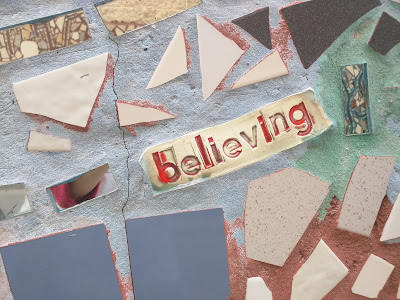{Street art at Magic Garden in Philadelphia}
Recently I was asked to share a short piece of advice for freelancers. But when do I ever keep things short? Rarely! Today I'll offer two pieces of advice. My thoughts are especially relevant to anyone who wants to try full-time freelancing. Those of you who have side hustles might not need to worry about this stuff as much, but you're still welcome around my campfire.
* Tip #1: Do not go full time without at least three months' worth of living expenses.
If you, like me, hope to be in the freelance/self-employment game for a long time, you need to be prepared for the long haul. For most (if not all) freelancers, there are dry months and dry seasons. It's better to be prepared for that reality by having a chunk of money stashed away in case of emergency. In order to know what three months' of living expenses are, you must track your expenses for a few months--I would recommend doing this for a whole year if you can.
I want to be really honest with you here. I was really prepared financially to weather the storms of freelancing, yet I still found myself completely overwhelmed by the money side of things. I have been slapped with a huge tax bill two years in a row. I have worked my tail off for very little money in the hopes that my time investment will yield fruit eventually. For me, learning to take these things in stride is part of the game.
In the spirit of being prepared for anything, make sure you can bankroll your own freelance lifestyle. Three months is a pretty modest recommendation, but my hope is that it feels do-able if you are dying to quit your job to go freelance.
* Tip #2: Identify your North Star. What do you really want out of freelancing?
When you are super burned out on your day job(s), freelancing can sound like an escape. And it is, sort of. But I think the sweetness of freelancing can be easily lost. It's not always easy to bring in the cash on a freelancer's hours.
My North Star is that I want to be lay-off-proof. By not having a single job, I have diversified my career portfolio. I am very fortunate that education is a field in which you can freelance and bring in a steady income nine months out of the year. (Summer is still my albatross. Don't ask how much money I made in July...)
I also want my work to be fun and energizing. I am arriving at a place in my freelancing where I feel I can say no to work that I don't particularly enjoy. I have not always felt this way--I'd say for the past two years, I took on any and every job that came my way. And I'm glad I did because all those jobs kept me trying new things. They kept me floating financially. But I'm in a different place now where I need to be more deliberate.
Once you've identified your North Star, it's time to dig deeper. Why does that thing matter so much to you? For me, feeling lay-off-proof is empowering. I like the feeling of being able to make money in lots of different ways. My career is agile, nimble, crafty. Trying to work as a science postdoc made me feel helpless and trapped; what I do now is the opposite of that. And I love it.
That being said...I do enjoy the benefit of one huge regular stream of income from one of my jobs (Science Guide at Acton Academy Southwest here in Austin). The path that I'm trying to navigate now is how to invest in something I enjoy, something I believe in, while keeping up with my other freelance work. A lot of my work at Acton has been a labor of love (meaning it has been a lot of work for not much money). But it's work that I wanted to do. Sometimes freelance life is like that: your purpose in doing the work is more than just the money. That's a beautiful thing and something to be treasured.
To summarize this tip: 1) try to figure out what your North Star, your guiding principle is for your freelancing ambitions. And then 2) try to figure out why it feels so important. If you really dig for why, I think you'll discover an emotion or a value that you want your career to embody. And once you find that, you'll find more ways to manifest it in your work and the rest of your life.

